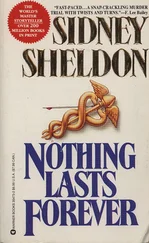He looked again at what he had. How was he going to carry all this stuff? He was going to need both hands, and the Thompson had no sling.
The kit bag had a canvas strap. Unhooked, it extended about five feet. Could one of the hooks hold him? If it could, and if he used the Thompson as a T-bar across the small iron door, he could lower himself into the shaft. Figuring on not being able to extend his arms fully because they'd be bearing almost all of his weight, he could get down perhaps as much as ten feet. If one hook could hold him, so could two — if the first hook failed, that would be the end of it, anyway.
The shoulder harness was thick, top-grain cowhide, and presumably stronger than the canvas of the kit bag sling. Another two feet, with the Browning stuffed in his belt. Another two feet. He might lose the Thompson. As well as the kit bag. No. He could leave the kit bag on one end of the sling, drop it into the shaft, and climb his way down around it, then down the shoulder harness. After he found a foothold, if he couldn't shake the Thompson loose, he could still reach up and unhook the shoulder bag. And if he had to give up all that firepower, they would think he was unarmed again — if, of course, he called it to their attention. First, there had to be a toehold.
Don't get ahead of yourself, boy. He thought. He had been able to step from the roof on the elevator to the catwalk here — step up: he had reached above his head for the railing. It took a little figuring. He could be as little as four or five feet above the conduits in the ceiling of the fortieth floor. Then what? Suppose they heard him scratching around overhead, like a rat inside the plaster?
He had to face the fact that he would go no farther down if he found a passageway at a safe level. If he could not have the relative security of the sling and harness, he would not be able to think about getting in there.
The clips were the weakest links. They could be nothing more than some kind of flattened wire. In the light, they'd looked like brass. He was going to see if he could rig a test, wrapping the Thompson around the railing. No noise. If they heard him crapping around, they would be on their way.
It was a good idea to think of other things when he could. It rested the mind. He wondered about the benefit in talking to himself. He'd thought for years that he'd never done it, but his mother had told Karen that he'd done it as a child. Karen had been an orphan, a foster child. She'd talked to herself. She'd remembered more of her childhood than he ever could remember of his. Since he'd never wanted to be anything but a cop, he'd spent his childhood in a dream world, playing, listening to the radio, passing the time, coming awake to make note of something only when someone spoke one of dozens of buzz words, like collar, the verb, or suspect, the noun.
His mother had given him so much support, he'd taken so much for granted, that he'd gotten past the middle of his life, and at the end of hers, before he'd realized how little he understood her. His relationship with Karen had a lot to do with that realization and his father's advancing senility. A lovely woman, his mother, a twentieth-century classic. She'd met her husband right after high school and her only child had been born before her twentieth birthday. She spent the rest of her life creating a home, which an unmarried man knew was making something out of nothing but love, will, effort, and sacrifice.
He stopped to get his bearings again. Even the cartoon Napoleon going out the window of the nut house paused for a check of the knotted bedsheets. Leland was going to know this building — perhaps for only four seconds, but he was going to know it. He made sure the safety was on the Thompson, and then he looped the sling over the railing, which had already taken his weight. The clips still worried him. He was going to be able to put pressure on only the first, there was so little room in here to maneuver. He had to clear his head.
He had to think that this was the same as changing a tire.
What would his mother think of him now? The real question was, what had she thought of him before she'd died? She'd always said she was proud of him, but later, when he was being honest with himself, he thought he could recall something else, too. He'd frightened her. Well, hell, he had frightened everybody. All his life, people had kept their distance, only rarely reaching for him.
A parent was entitled to reservations about his or her child, and he doubted that his mother's generation was the first to realize it. He had his reservations about Steffie downstairs. He used to play Monopoly with her, hoping she'd win. There was a lot of real life on Park Place and the Boardwalk.
Now it was cocaine with Ellis. What Leland really knew about drugs had come from Norma, who had started smoking marijuana while he was seeing her. It was the time when drugs first started flooding into the country. He passed; with his track record on intoxicants, he thought he was doing himself a favor. What you made of drugs, like alcohol, was entirely a matter of your personality — and that was what disturbed him about this situation. He knew enough about Steffie and cocaine to see that the stuff could only re-enforce everything ugly in her. Cocaine was for power-trippers, people looking for an advantage, an edge — like Ellis.
Like Stephanie. He took a breath.
In. He could not think about his fear. Four hundred feet. The cartridge had taken so long to fall that he had wondered what happened to it. The submachine gun was braced against the bottom of the opening. The door itself was swung wide against the wall, and it was too heavy to swing back to trap the Thompson. Leland thought he was going to lose the gun anyway. The shaft was too wide for him to brace himself across it with his back and feet. He did not begin to put weight on the harness until he was hanging from the opening with his hands. Nothing shifted. Now he was fully inside.
As he hung from the harness, he worked his feet around the walls, probing for an opening. The walls seemed to be covered with some kind of fine dust. He was still within reach of the opening. He had to go farther down, but he didn't believe in it anymore. He didn't believe it would work.
He had to stop thinking: he had no choice.
He lowered himself, one hand under the other, until he passed over the kit bag and down to the middle of the sling. It was too dark to see his hands. He swung his feet around, touching all four sides again. No opening. He had to go lower.
Oh, God, please don't let me fall. He had about three feet of canvas strap left. Once more, he swung his feet around. On the right, the wall fell away. He had to go lower still, maybe as much as two feet.
No. His foot touched the floor of the horizontal shaft almost immediately. The shaft was no more than twelve inches high.
At least he had something to put his weight on. It was pitch-black in here. What he had to decide was whether he should take a chance on the horizontal shaft. Once he dislodged the Thompson, there would be no way back up.
If the little shaft branched again, he could be stuck in it for days, maybe for good.
He worked his right leg, then his left, into the shaft until he was on his knees, hanging onto the last fifteen inches of the canvas strap. He had to take the pressure off it for the Thompson to fall away from the bottom of the opening. But he was still using the strap for balance.
Take your time, boy. He dried his left hand on his pants and braced it against the opposite wall. Slowly he released his pull on the strap. From above came a clunk that he felt more than heard. Now the strap would no longer take his weight.
He lowered himself down the main shaft, pushing his legs into the horizontal shaft as far as he could, getting the backs of his thighs against the upper wall. It was as far as he could go without letting go of the strap.
Читать дальше











